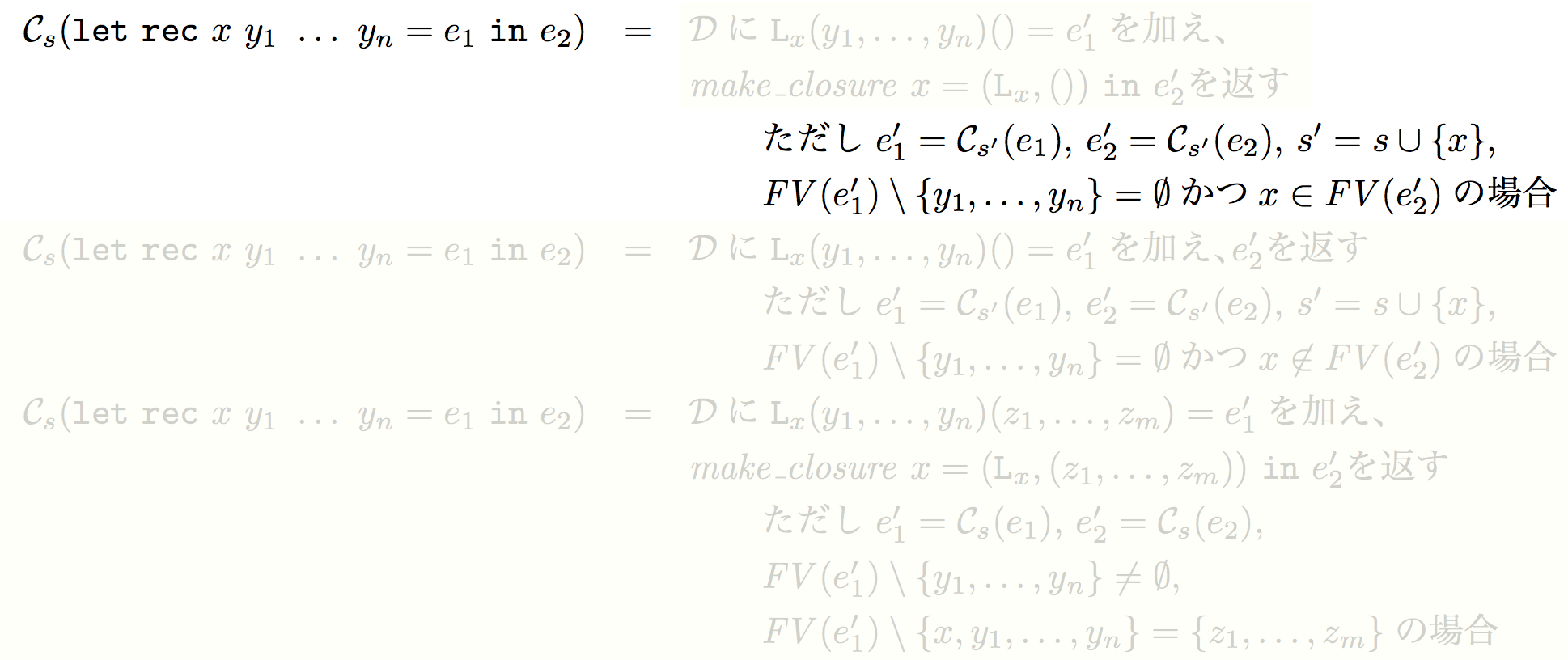Closure Conversion
Ken Wakita (https://wakita.github.io/fp2017/)
Nov 6, 2017
Overview
Compiler Pipeline
let lexbuf outchan l =
...... .......
(..........
(......
(.........
(Closure.f
(.... !.....
(.......
(.........
(........
(.......... ........... .)))))))))Functions and Closures
FP-style Functions
let a = 3 in
let b = 4 in
let rec f x y =
a * x + b * y in
Printf.printf "%d\n" (f 5 6);;Assume no optimization is performed
- FP-style function: (e.g.,
f)- Parameters:
xandy - Free variables:
aandb
- Parameters:
- C-like
- No free variables
- Problem:
- How do we emulate FP-style function application in C-like language.
Closure technique (OCaml version)
let apply_2arg_2fv arg1 arg2 closure =
let a_function_implementation, (fv1, fv2) = closure in
a_function_implementation arg1 arg2 fv1 fv2 in
let rec f_implementation x y a b =
a * x + b * y in
let a = 3 in
let b = 4 in
let closure = (f_implementation, (a, b)) in
Printf.printf "%d\n" (apply_2arg_2fv 5 6 closure)Closure technique (C equivalent)
typedef struct {
int (*fp)(int, int, int, int);
int fv1; int fv2; } Closure_II_II_I;
int apply_II_II_I(int v1, int v2, Closure_II_II_I *closure) {
int (*fp)(int, int, int, int) = closure->fp;
int fv1 = closure->fv1, fv2 = closure->fv2;
return fp(v1, v2, fv1, fv2); }int f_in_c_style(int x, int y, int a, int b) { return a * x + b * y; }
int main() {
const int a = 3, b = 4;
Closure_II_II_I closure_f = { f_in_c_style, a, b };
printf("%d\n", apply_II_II_I(5, 6, &closure_f)); }Naive Closure Conversion
The Format of Naive Closure Conversion
\[\begin {align} {\cal C}&: \text {KNormal.t} \rightarrow \text {Closure.t} \\ {\cal C}(e: \text {KNormal.t}) &= p: \text {Closure.t} \end {align}\]
Simply-Minded Conversion (Application site)
\[\begin {align} {\cal C}(x\ y_1 \ldots y_n) = \mathit {apply\_closure}(x, y_1, \ldots, y_n) \end {align}\]
Simply-Minded Conversion (Definition)
\[\begin {align} {\cal C}(\text {let rec } &x\ y_1 \ldots y_n = e_1 \text { in } e_2 = \\ & {\cal D} \text { += } \mathtt {L}_x(y_1, \ldots, y_n)(z_1, \ldots, z_m) = e_1'; \\ & \mathit {make\_closure}\ x = (\mathtt {L}_x, (z_1, \ldots, z_m)) \text { in } e_2' \\ & \text {where } e_1' = {\cal C}(e_1), e_2' = {\cal C}(e_2),\\ & \text {and } \{z_1, \ldots, z_m\} = \mathit {FV}(e_1') \setminus \{x, y_1, \ldots, y_n\} \end {align}\]
Smarter Closure Conversion
The Format of Smarter Closure Conversion
\[\begin {align} {\cal C}&: \text {S.t} \rightarrow \text {KNormal.t} \rightarrow \text {Closure.t} \\ s&: \text {The set of known closed functions} \\ & \quad \text {(functions that do not see free varialbes} \\ {\cal C}_s(e: \text {KNormal.t}) &= p: \text {Closure.t} \end {align}\]
Smarter Conversion (Definition)
\[\begin {align} {\cal C}_s&(\text {let rec } x\ y_1 \ldots y_n = e_1 \text { in } e_2 = \\ & {\cal D} \text { += } \mathtt {L}_x(y_1, \ldots, y_n)(z_1, \ldots, z_m) = e_1'; \\ & \begin {cases} \mathit {make\_closure}\ x = (\mathtt {L}_x, ()) \text { in } e_2' \\ \text {where } e_1' = {\cal C}_{s'}(e_1), e_2' = {\cal C}_{s'}(e_2), \\ \text {and } s' = s \cup \{ x \} & \text {when } \mathit {FV}(e_1') \setminus \{y_1, \ldots, y_n\} = \emptyset \\ \\ \mathit {make\_closure}\ x = (\mathtt {L}_x, (z_1, \ldots, z_m)) \text { in } e_2' \\ \text {where } e_1' = {\cal C}(e_1), e_2' = {\cal C}(e_2),\\ \text {and } \{z_1, \ldots, z_m\} = \mathit {FV}(e_1') \setminus \{x, y_1, \ldots, y_n\} & \text {otherwise} \end {cases} \end {align}\]
Discussion
The condition of the first case says: \(\mathit {FV}(e_1') \setminus \{y_1, \ldots, y_n\} = \emptyset\)
rather than: \(\mathit {FV}(e_1') \setminus \{x, y_1, \ldots, y_n\} = \emptyset\)
Smarter Conversion (Application)
\[\begin {align} {\cal C}_s(x\ y_1\ldots y_n) &= \begin {cases} \mathit {apply\_closure}(x, y_1, \ldots, y_n) & x \not\in s \\ \mathit {apply\_direct}(\mathtt {L}_x, y_1, \ldots, y_n) & x \in s \end {cases} \end {align}\]
Even Smarter Conversion
Definition

- Restraint on closure creation (less of
make_closure)